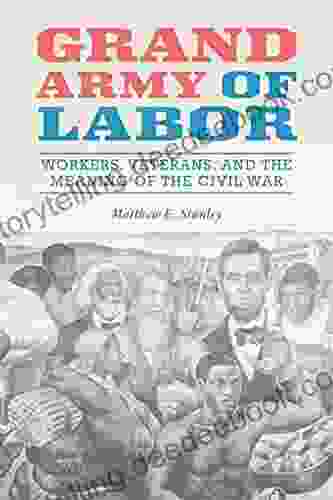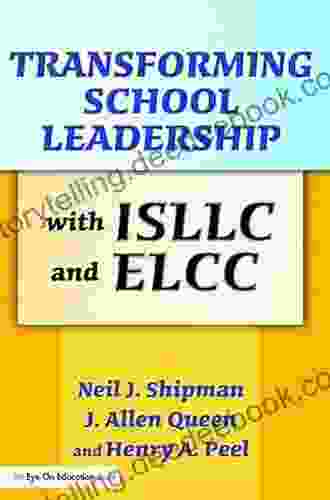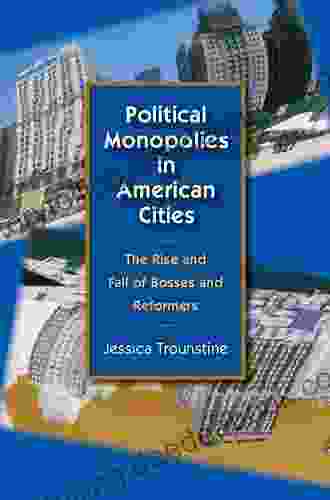Workers, Veterans, and the Meaning of the Civil War for the American Working Class

The American Civil War was a watershed moment in the history of the United States. It marked the end of slavery and the beginning of a new era of industrialization. The war also had a profound impact on the working class, both in the North and the South.
In the North, the war led to a surge in industrial production. This created new jobs and opportunities for workers. However, it also led to the rise of new forms of exploitation and oppression. Workers were often forced to work long hours in dangerous conditions for low pay. They were also subject to the whims of their employers, who often fired them at will.
In the South, the war had a devastating impact on the economy. The loss of slave labor crippled the plantation system. This led to widespread poverty and unemployment among white workers. Many former slaves also found themselves in a state of economic hardship.
5 out of 5
| Language | : | English |
| File size | : | 5680 KB |
| Text-to-Speech | : | Enabled |
| Screen Reader | : | Supported |
| Enhanced typesetting | : | Enabled |
| Word Wise | : | Enabled |
| Print length | : | 322 pages |
| X-Ray for textbooks | : | Enabled |
The Civil War also had a profound impact on the ideology of the working class. Before the war, most workers were content with their status. They believed that they would eventually be able to achieve economic security through hard work and determination. However, the war shattered this illusion. Workers realized that they were at the mercy of the wealthy and powerful. They began to question the system that had kept them in poverty and oppression.
In the years after the war, the working class became increasingly radicalized. They organized unions, went on strike, and even formed their own political parties. This movement for workers' rights was ultimately successful in achieving some major reforms, such as the eight-hour workday and the minimum wage. However, the legacy of the Civil War continued to haunt the American working class for decades to come.
The Impact of the Civil War on Northern Workers
The Civil War had a mixed impact on Northern workers. On the one hand, the war led to a surge in industrial production. This created new jobs and opportunities for workers. On the other hand, it also led to the rise of new forms of exploitation and oppression.
One of the most significant changes that occurred during the Civil War was the rise of the factory system. Before the war, most goods were produced by skilled craftsmen in small workshops. However, the war created a huge demand for manufactured goods. This led to the development of factories, which were able to produce goods more quickly and efficiently than workshops.
The factory system had a number of negative consequences for workers. First, it led to the decline of skilled labor. Factory workers were often unskilled and performed repetitive tareas. This made them easily replaceable and vulnerable to exploitation. Second, the factory system led to the rise of child labor. Children were often employed in factories because they were paid less than adults. Third, the factory system created dangerous working conditions. Workers were often exposed to toxic chemicals and machinery.
Another major change that occurred during the Civil War was the rise of the wage labor system. Before the war, most workers were self-employed farmers or craftsmen. However, the war created a huge demand for labor. This led to the development of the wage labor system, in which workers sold their labor to employers in exchange for wages.
The wage labor system had a number of negative consequences for workers. First, it made workers dependent on their employers for their livelihood. This made them vulnerable to exploitation. Second, the wage labor system led to the decline of labor unions. Unions were often unable to organize workers in factories because employers could easily replace them with other workers. Third, the wage labor system created a class division between workers and employers. This division would continue to grow in the years after the war.
The Impact of the Civil War on Southern Workers
The Civil War had a devastating impact on the Southern economy. The loss of slave labor crippled the plantation system. This led to widespread poverty and unemployment among white workers. Many former slaves also found themselves in a state of economic hardship.
White workers in the South were particularly hard hit by the war. Before the war, most white workers were small farmers or skilled craftsmen. However, the war destroyed the Southern economy and left many white workers without a livelihood. Many white workers were forced to take on low-paying jobs in factories or mines. Others were forced to become sharecroppers or tenant farmers.
Former slaves also faced economic hardship after the war. Although they were now free, they had no land or money. Many former slaves were forced to work as sharecroppers or tenant farmers. Others were forced to take on low-paying jobs in factories or mines.
The economic hardship that white workers and former slaves faced after the war led to a rise in racial tensions. White workers often blamed former slaves for their economic problems. This led to a number of race riots and lynchings in the years after the war.
The Legacy of the Civil War for the American Working Class
The Civil War had a profound impact on the American working class. The war led to a surge in industrial production, the rise of the factory system, and the development of the wage labor system. These changes had a number of negative consequences for workers, including the decline of skilled labor, the rise of child labor, and the creation of dangerous working conditions.
The Civil War also had a significant impact on the ideology of the working class. Before the war, most workers were content with their status. They believed that they would eventually be able to achieve economic security through hard work and determination. However, the war shattered this illusion. Workers realized that they were at the mercy of the wealthy and powerful. They began to question the system that had kept them in poverty and oppression.
In the years after the war, the working class became increasingly radicalized. They organized unions, went on strike, and even formed their own political parties. This movement for workers' rights was ultimately successful in achieving some major reforms, such as the eight-hour workday and the minimum wage. However, the legacy of the Civil War continued to haunt the American working class for decades to come.
The Civil War was a watershed moment in the history of the United States. It marked the end of slavery and the beginning of a new era of industrialization. The war also had a profound impact on the working class, both in the North and the South. The legacy of the Civil War continues to shape the American working class today.
5 out of 5
| Language | : | English |
| File size | : | 5680 KB |
| Text-to-Speech | : | Enabled |
| Screen Reader | : | Supported |
| Enhanced typesetting | : | Enabled |
| Word Wise | : | Enabled |
| Print length | : | 322 pages |
| X-Ray for textbooks | : | Enabled |
Do you want to contribute by writing guest posts on this blog?
Please contact us and send us a resume of previous articles that you have written.
 Book
Book Text
Text Story
Story Genre
Genre Reader
Reader Library
Library Magazine
Magazine Newspaper
Newspaper Sentence
Sentence Bookmark
Bookmark Glossary
Glossary Bibliography
Bibliography Preface
Preface Synopsis
Synopsis Annotation
Annotation Footnote
Footnote Scroll
Scroll Tome
Tome Bestseller
Bestseller Library card
Library card Biography
Biography Memoir
Memoir Reference
Reference Dictionary
Dictionary Thesaurus
Thesaurus Narrator
Narrator Character
Character Librarian
Librarian Card Catalog
Card Catalog Borrowing
Borrowing Scholarly
Scholarly Reserve
Reserve Journals
Journals Interlibrary
Interlibrary Thesis
Thesis Dissertation
Dissertation Storytelling
Storytelling Awards
Awards Book Club
Book Club Theory
Theory Sandeep Senghera
Sandeep Senghera Beatrice Gormley
Beatrice Gormley Jim Mcghee
Jim Mcghee Chelsea Vowel
Chelsea Vowel Alvin C Burns
Alvin C Burns Angelo Codevilla
Angelo Codevilla David Wong
David Wong Pamela Ackerson
Pamela Ackerson Patrice Walker
Patrice Walker Nick Pernisco
Nick Pernisco David Carlyon
David Carlyon Ann Richards
Ann Richards Alan Furst
Alan Furst Felicia Allen
Felicia Allen Barbara Carroll
Barbara Carroll Henry Dodwell
Henry Dodwell H G Wells
H G Wells John Butt
John Butt 2 Subnd Edition Kindle Edition
2 Subnd Edition Kindle Edition Takashi Tokoro
Takashi Tokoro
Light bulbAdvertise smarter! Our strategic ad space ensures maximum exposure. Reserve your spot today!

 Tom ClancyObject Detection in Low Spatial Resolution Aerial Imagery Using Convolutional...
Tom ClancyObject Detection in Low Spatial Resolution Aerial Imagery Using Convolutional... Brennan BlairFollow ·4.8k
Brennan BlairFollow ·4.8k Braden WardFollow ·7.4k
Braden WardFollow ·7.4k Miguel NelsonFollow ·14.7k
Miguel NelsonFollow ·14.7k Brenton CoxFollow ·2.3k
Brenton CoxFollow ·2.3k Julio CortázarFollow ·17.3k
Julio CortázarFollow ·17.3k Italo CalvinoFollow ·19.1k
Italo CalvinoFollow ·19.1k Federico García LorcaFollow ·7.9k
Federico García LorcaFollow ·7.9k Paulo CoelhoFollow ·14.4k
Paulo CoelhoFollow ·14.4k
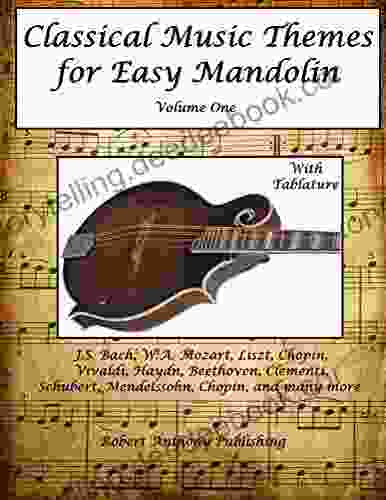
 Howard Blair
Howard BlairClassical Music Themes for Easy Mandolin, Volume One
Classical Music Themes for Easy Mandolin,...

 Paulo Coelho
Paulo CoelhoThe Heretic Tomb: Unraveling the Mysteries of a Lost...
Synopsis In Simon Rose's captivating debut...

 Rodney Parker
Rodney ParkerThe Passionate Friends Annotated Wells: A Deeper...
Unveiling the...
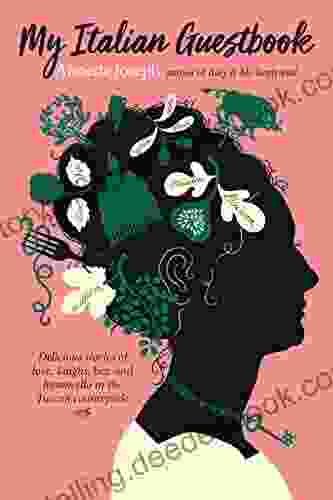
 Ed Cooper
Ed CooperDelicious Stories of Love, Laughs, Lies, and Limoncello...
In the heart of...

 Elmer Powell
Elmer PowellHal Leonard Piano For Kids Songbook: Unleashing the...
Music holds immense...
5 out of 5
| Language | : | English |
| File size | : | 5680 KB |
| Text-to-Speech | : | Enabled |
| Screen Reader | : | Supported |
| Enhanced typesetting | : | Enabled |
| Word Wise | : | Enabled |
| Print length | : | 322 pages |
| X-Ray for textbooks | : | Enabled |


